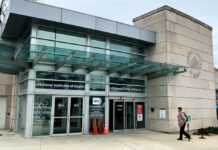The fact the Biden administration is waiting longer than the Trudeau administration in Ottawa to allow vaccinated residents to cross into the opposite country is somewhat akin to a border wall – like the one along U.S.-Mexico that President Biden halted in January, the panel of “The Five” debated Wednesday.
Since the outbreak of the coronavirus in North America, the U.S.-Canadian border has been subject to some of the tightest restrictions, with extremely limited situations qualifying as essential crossings.
On “The Five,” the panel discussed how Prime Minister Justin Trudeau, a liberal, announced August 9 as the date vaccinated Americans can once again visit their nation’s closest ally.
Host Dagen McDowell noted that the U.S.-Mexico border is a “free-for-all” for unvaccinated and unvetted foreign nationals under Biden’s new lax homeland security policies, while Canadian citizens have been prevented from entering the United States.
“They postponed the Canadian border reopening until August 21,” McDowell said of Biden’s administration. “Canada is letting vaccinated Americans into Canada starting on August 9.”
“Are they saying vaccinated Canadians can’t come to this country but unvaccinated migrants can?” Watters asked.
“In a way, they put a wall up on the northern border — that is very interesting,” he added.
McDowell surmised that the White House’s lack of urgency to return the Canadian border to normal operations is because loosening restrictions there has no political benefit for the White House.
Many communities, especially in Alaska, New York and Maine, relied on cross-border travel and have taken a heavy economic hit amid the lockdown.
In Alaska in particular, Gov. Michael Dunleavy and the three members of the state’s congressional delegation – Rep. Don Young and Sens. Lisa Murkowski and Dan Sullivan, all Republicans – have sought solutions to the policy, which has made it difficult for the isolated 49th state.
“As we continue to work together to address the unprecedented challenges of COVID-19, to keep our residents and citizens safe and healthy, we appreciate the consideration for reasonable land crossing exceptions for essential travel between Alaska and the contiguous United States through your country,” the trio wrote in an October 2020 letter to Trudeau, asking for a diplomatic solution that helps both countries.
They used the example of the less-than-100-population village of Hyder, Alaska, the only road through which connects to Canada rather than the rest of the state’s Inside Passage region.
“[T]he Biden Administration must do more to open [the Alaska (motor) Highway] through Canada. Anything less is a land blockade with Washington silent,” Dunleavy also said in a series of tweets directed at the White House last month.
Throughout the pandemic, the Canadian government has allowed limited land travel for Alaskans transiting to the state from the Lower 48 through Canada, as well as mainland residents traveling from the Last Frontier back.
The Alaska Marine Highway – a series of long-haul toll ferries with some lodging capabilities – still, however, connects southern Alaska with Bellingham, Wash., and air travel remains permitted.
On the other end of the U.S.-Canada border, the lockdown altered the “interwoven” dynamic between Maine border communities and those in New Brunswick.
As the Wall Street Journal described in 2020, towns like Madawaska, Maine and Edmundston, N.B. have seen their federal border as “more concept than barrier.” Canadians, the paper reported, often purchased their commodities like groceries and gasoline in the United States, while Americans sought other products on the Canadian side day-to-day, and families split between both towns remained cut-off at the time.
CLICK HERE TO GET THE FOX NEWS APP
In reopening the border to Americans on August 9, Trudeau said this week that “thanks to the rising vaccination rates and declining COVID-19 cases, we are able to move forward with adjusted border measures.”
“Unless amended or rescinded”, the U.S. Department of Homeland Security announced its reopening plan tentatively set to August 21.








